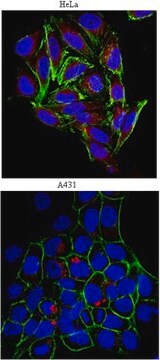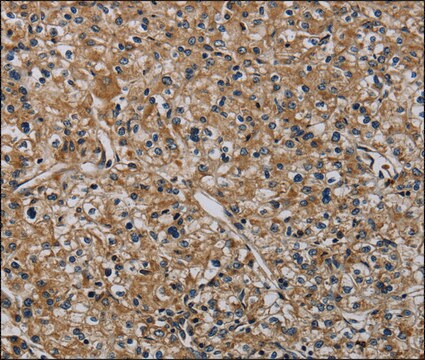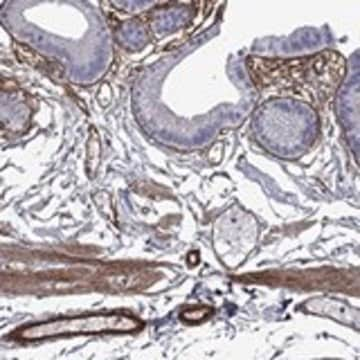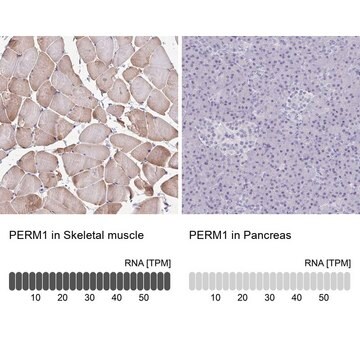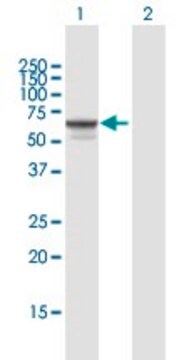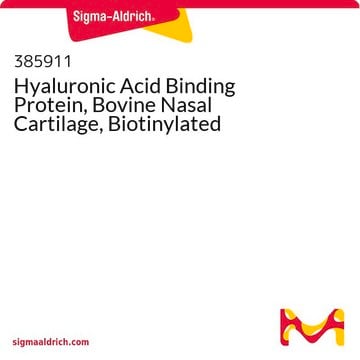MAB2040
抗ヘパリン/ヘパラン硫酸抗体、クローンT320.11
clone T320.11, Chemicon®, from mouse
別名:
Anti-Heparan Sulfate, Clone T320.11 Anti-Heparin, Heparan Sulfate Detection
ログイン組織・契約価格を表示する
すべての画像(1)
About This Item
UNSPSCコード:
12352203
eCl@ss:
32160702
NACRES:
NA.41
クローン:
T320.11, monoclonal
application:
ELISA
RIA
WB
RIA
WB
テクニック:
ELISA: suitable
radioimmunoassay: suitable
western blot: suitable
radioimmunoassay: suitable
western blot: suitable
citations:
22
おすすめの製品
由来生物
mouse
品質水準
抗体製品の状態
purified immunoglobulin
抗体製品タイプ
primary antibodies
クローン
T320.11, monoclonal
化学種の反応性(ホモロジーによる予測)
mammals
メーカー/製品名
Chemicon®
テクニック
ELISA: suitable
radioimmunoassay: suitable
western blot: suitable
アイソタイプ
IgG1
輸送温度
wet ice
ターゲットの翻訳後修飾
unmodified
遺伝子情報
human ... HSPG2(3339)
特異性
ヘパリン/ヘパラン硫酸と反応します。DNAと低親和性の交差反応性を示します。クローンがデキストラン硫酸とも交差反応することが報告されています(Mahmood, 2002)。
アプリケーション
この抗ヘパリン/ヘパラン硫酸抗体、クローンT320.11を用いたヘパリン/ヘパラン硫酸の検出は、ELISA、RIA、WBでの使用が検証されています。
ウェスタンブロッティング(ヘパラン硫酸プロテオグリカンを認識)1:1000
EIA/RIA:推奨濃度は1~10 μg/mLです。
最適な希釈濃度は、ご自身で決定してください。
EIA/RIA:推奨濃度は1~10 μg/mLです。
最適な希釈濃度は、ご自身で決定してください。
研究カテゴリー
細胞構造
細胞構造
研究サブカテゴリー
ECMタンパク質
ECMタンパク質
ターゲットの説明
64 kDa
物理的形状
0.1%アジ化ナトリウムを保存剤として含有する20 mMリン酸ナトリウム、250 mM塩化ナトリウム、pH 7.6に含まれるプロテインA精製マウス免疫グロブリン。
フォーマット:精製
保管および安定性
2–8°Cで出荷日から1年間保存できます。凍結融解を繰り返さないために、分注してください。製品の回復を最大化させるため、キャップを外す前の元のバイアルを融解後に遠心分離してください。
アナリシスノート
対照
広範に発現
広範に発現
その他情報
濃度:ロットに固有の濃度につきましては試験成績書をご参照ください。
法的情報
CHEMICON is a registered trademark of Merck KGaA, Darmstadt, Germany
免責事項
メルクのカタログまたは製品に添付されたメルクのその他の文書に記載されていない場合、メルクの製品は研究用途のみを目的としているため、他のいかなる目的にも使用することはできません。このような目的としては、未承認の商業用途、in vitroの診断用途、ex vivoあるいはin vivoの治療用途、またはヒトあるいは動物へのあらゆる種類の消費あるいは適用などがありますが、これらに限定されません。
適切な製品が見つかりませんか。
製品選択ツール.をお試しください
保管分類コード
12 - Non Combustible Liquids
WGK
WGK 2
引火点(°F)
Not applicable
引火点(℃)
Not applicable
適用法令
試験研究用途を考慮した関連法令を主に挙げております。化学物質以外については、一部の情報のみ提供しています。 製品を安全かつ合法的に使用することは、使用者の義務です。最新情報により修正される場合があります。WEBの反映には時間を要することがあるため、適宜SDSをご参照ください。
Jan Code
MAB2040:
試験成績書(COA)
製品のロット番号・バッチ番号を入力して、試験成績書(COA) を検索できます。ロット番号・バッチ番号は、製品ラベルに「Lot」または「Batch」に続いて記載されています。
この製品を見ている人はこちらもチェック
Emilie Barilleau et al.
BMC microbiology, 21(1), 153-153 (2021-05-23)
Salmonella can invade host cells via a type three secretion system called T3SS-1 and its outer membrane proteins, PagN and Rck. However, the mechanism of PagN-dependent invasion pathway used by Salmonella enterica, subspecies enterica serovar Typhimurium remains unclear. Here, we
Thomas Welte et al.
iScience, 24(11), 103349-103349 (2021-11-27)
Myeloid-derived suppressor cells (MDSCs) infiltrate cancer tissue, promote tumor growth, and are associated with resistance to cancer therapies. However, there is no practical approach available to distinguish MDSCs from mature counterparts inside tumors. Here, we show that a recently isolated
Kyeoung-Hwa Kim et al.
Cellular physiology and biochemistry : international journal of experimental cellular physiology, biochemistry, and pharmacology, 45(1), 37-53 (2018-01-10)
Previously, we found that silencing of growth arrest-specific gene 6 (Gas6) in oocytes impaired cytoplasmic maturation, resulting in failure of sperm chromatin decondensation (SCD) and pronuclear (PN) formation after fertilization. Thus, we conducted this study to determine the effect of
UDP-N-acetylglucosamine transporter (SLC35A3) regulates biosynthesis of highly branched N-glycans and keratan sulfate.
Maszczak-Seneczko, D; Sosicka, P; Olczak, T; Jakimowicz, P; Majkowski, M; Olczak, M
The Journal of Biological Chemistry null
Yan Li et al.
Molecular medicine reports, 15(6), 3529-3534 (2017-04-26)
Damage of retinal ganglion cells (RGCs) is the major consequence of glaucoma and regeneration of RGCs is extremely difficult once the damage has occurred. Retinal stem cells (RSCs) are considered an ideal choice for RGC regeneration. Pigmented cells from the
ライフサイエンス、有機合成、材料科学、クロマトグラフィー、分析など、あらゆる分野の研究に経験のあるメンバーがおります。.
製品に関するお問い合わせはこちら(テクニカルサービス)